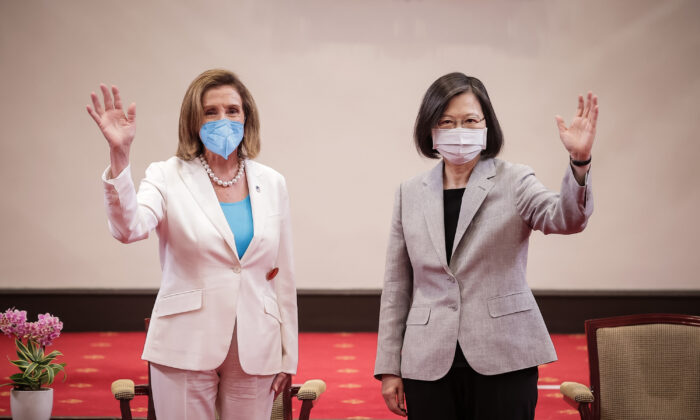On Wednesday, US House Speaker Nancy Pelosi met with Taiwanese President Tsai Ing-Wen in Taipei. During their meeting, she emphasised the value of democracy and reaffirmed Washington’s unequivocal support for the island.
America’s third-highest official declared that the US’s commitment to maintaining Taiwan’s sovereignty is “iron-clad,” noting that the world is currently actively considering democracy and autocracy.
Pelosi, who arrived in Taiwan on Tuesday and exacerbated already strained US-China relations, asserted that Washington’s support for Taipei is essential “now more than ever.”
“Taiwan is a flourishing democracy. It has proven to the world that hope, courage & determination can build a peaceful & prosperous future despite the challenges it faces. Now, more than ever, America’s solidarity with Taiwan is crucial, that’s the message we bring in today,” said US House Speaker Nancy Pelosi, adding that “our delegation came to Taiwan to make unequivocally clear we will not abandon Taiwan.”
“Today, the world faces a choice between democracy and autocracy. America’s determination to preserve democracy here in Taiwan and in the world remains iron-clad,” she added.
She shared this on twitter;
“Our delegation’s visit to Taiwan honours America’s unwavering commitment to supporting Taiwan’s vibrant Democracy. Our discussions with Taiwan leadership reaffirm our support for our partner & promote our shared interests, including advancing a free & open Indo-Pacific region.”
“America’s solidarity with the 23 million people of Taiwan is more important today than ever, as the world faces a choice between autocracy and democracy. Our visit is one of several Congressional delegations to Taiwan – and it in no way contradicts longstanding United States policy, guided by the Taiwan Relations Act of 1979, U.S.-China Joint Communiques and the Six Assurances,” she further added. See here.
https://twitter.com/SpeakerPelosi/status/1554482274430844928
By stating that Taipei is dedicated to upholding “peace and stability,” the president of Taiwan also demonstrated the island’s close ties to the United States. Tsai said, “Taiwan is committed to maintaining peace & stability in the Taiwan Strait, and we will make Taiwan a key stabilising force for regional security ensuring a free & open Indo-Pacific”.
Given the massive attention paid to Taiwan due to the Russian-Ukraine conflict, attacking Taipei would have a negative impact on the entire Indo-Pacific region, she added further.
“We will firmly uphold our nation’s sovereignty & continue to hold the line of defence. At the same time, we wish to cooperate & work with unity with all democracies around the world to safeguard democratic values,” Taiwan’s President, Tsai Ing-wen, also said.
Nancy Pelosi, US House Speaker, applauded the “thriving” partnership between Washington and Taipei, reaffirming America’s support for Taiwan over China’s harsh criticism.
She further added, “America has made a bedrock promise to always stand with Taiwan. On this strong foundation, we’ve a thriving partnership grounded in self-government & self-determination focused on mutual security in the region & world committed to economic prosperity.”
She told Taiwan’s parliament “Purposes of this visit are the security of our people (global security), economics and governance. We want to increase inter-Parliamentary dialogue.”
“We want to listen & learn from you on how to go ahead together,” she further added.
For years, the China-Taiwan relationship has been strained.
In 1949, China and Taiwan split due to civil war. China, on the other hand, considers Taiwan to be part of its territory that can be seized by force if necessary.
In the 1980s, relations between China and Taiwan began to improve after years of hostility and venomous rhetoric. China proposed a “one country, two systems” formula in which Taiwan would be granted significant autonomy in exchange for accepting Chinese reunification.
The offer was forthrightly turned down in Taiwan.
The Taiwanese had demanded that if they were to accept the one-country, two-systems approach, they must accept the following conditions:
People’s Republic of China (PRC) should be renamed as the Republic of China and, Democratic elections would have to be conducted in mainland China.
This was however not accepted by mainland China.
A Chinese effort to take Taiwan by force may draw a red line for any Chinese effort to do so. India and other countries may set a red line for any Chinese military takeover of Taiwan. Since the principle of peaceful dispute resolution is upheld internationally, the Taiwan issue is more than just a moral dilemma of tolerating the destruction of a successful democracy by a totalitarian regime.












